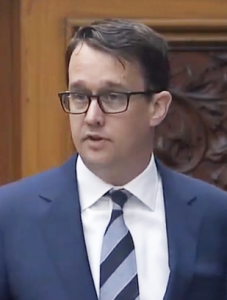Licensing temporary help agencies not enough to protect workers, MRCC says
Licensing temporary help agencies not enough to protect workers, MRCC says

Monte McNaughton,
Minister of Labour, immigration, Training and Skills Development
By Lui Queaño
LJI Reporter
The Philippine Reporter
On July 5, 2023, the Ontario government announced that it would require temporary help agencies (THAs) to have a license to operate in the province as of January 1, 2024.
“Our government’s licensing system will ensure law-abiding businesses can have confidence in the THAs and recruiters they work with and that those who abuse workers face the harshest fines in Canada and are banned from operating in our province,” said Monte McNaughton, Minister of Labour, immigration, Training and Skills Development in his official press announcement.
This move is also intended to ensure as well the protection of workers as investigations by the Ministry have shown that several THAs in Ontario are illegally paying workers below the minimum wage and denying other basic employment rights to gain unfair competitive advantage over law-abiding agencies by undercutting rates, said the announcement.
“it will be against the law for companies to knowingly use unlicensed businesses for staffing, and those who hire deceitful recruiters will be required to repay workers for any illegal fees charged to them,” the statement said.
Those victimized, however, are the most vulnerable workers such as the non-status workers, temporary migrant workers, caregivers, and international students, who precisely because of their non status or temporary status, remain in very precarious employment situations that make it difficult for them to readily hold their abusers accountable for their actions.
 Asked to comment by The Philippine Reporter on this issue, the Migrant Resource Centre Canada released the following statement:
Asked to comment by The Philippine Reporter on this issue, the Migrant Resource Centre Canada released the following statement:
“Ontario implemented a new policy which requires temporary help agencies and recruiters to be licensed under the Employment Standards Act (ESA), 2000. Beginning on January 1, 2004, the province mandates that both the temporary help agencies and recruiters hold licenses in order to operate.
“Though MRCC sees this as a step in the right direction, we also acknowledge that the scope of this new policy does not cover the protection of all workers. It does not provide guidance for addressing the issues that the most exploited workers, the non-status workers, face in the province and in the country. Hence, we continue to call on the government, both provincial and federal, to provide a more comprehensive approach and to regularize all workers, including and especially those who fell out of status.”



Comments (0)